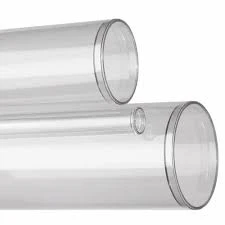Dec . 11, 2024 10:39 Back to list
Exploring the Properties and Applications of PVC Chemical Pipes in Modern Infrastructure
The Versatility and Applications of PVC Chemical Pipes
Polyvinyl chloride (PVC) has emerged as one of the most popular materials in the world for the manufacturing of piping systems, particularly in chemical applications. Known for its durability, resistance to corrosion, and cost-effectiveness, PVC chemical pipes are increasingly replacing traditional materials such as steel and copper in various industries.
Understanding PVC Chemical Pipes
PVC chemical pipes are specifically designed to handle a wide range of chemical substances, including acids, alkalis, and other corrosive materials. The manufacturing process involves polymerizing vinyl chloride, resulting in a strong and resilient material that can withstand harsh environments. These pipes are typically lightweight, making them easy to transport and install. Furthermore, PVC pipes are available in various diameters and lengths, catering to different requirements across industries.
Key Advantages of PVC Chemical Pipes
1. Corrosion Resistance One of the most significant advantages of PVC pipes is their resistance to corrosion. Unlike metal pipes that can rust or corrode over time, PVC is impervious to many chemicals, which prolongs its lifespan and reduces maintenance costs.
2. Cost-Effectiveness PVC chemical pipes are often more economical than their counterparts made from other materials. Both the material and installation costs are lower, making PVC an attractive choice for budget-conscious projects.
3. Lightweight and Easy to Install The lightweight nature of PVC makes it easier to handle and install, reducing labor costs and time during construction. This characteristic is particularly advantageous in large-scale projects where moving and assembling pipes can be challenging.
4. Smooth Interior Surface The internal surface of PVC pipes is smooth, which reduces friction and promotes better flow of liquids and gases. This characteristic is essential in applications where effective fluid transport is critical.
5. Versatility PVC pipes can be used in various applications across multiple industries, including chemical processing, wastewater management, and construction. They can handle a wide variety of chemicals, making them adaptable to different operational needs.
Applications of PVC Chemical Pipes
pvc chemical pipe

Due to their unique properties, PVC chemical pipes have found applications in numerous fields
1. Chemical Processing In the chemical industry, PVC pipes are used for transporting aggressive substances, including acids, caustics, and solvents. Their ability to withstand high pressures and corrosion makes them ideal for these environments.
2. Water Treatment Plants PVC is commonly used in water treatment facilities for piping systems that handle chemicals for disinfection and purification processes. Their resistance to chemical reactions ensures that they remain durable and effective.
3. Agricultural Irrigation PVC pipes play a crucial role in agricultural applications, particularly in irrigation systems. They facilitate the efficient transport of water and fertilizers without the risk of contamination.
4. Pharmaceutical Industry In the pharmaceutical sector, maintaining the integrity of chemical processes is paramount. PVC pipes are utilized in manufacturing environments where hygiene and safety are critical, given their resistance to various chemicals.
5. Construction PVC pipes are extensively used in building projects for drainage and ventilation systems due to their durability and resistance to various elements.
Environmental Considerations
While PVC pipes offer many advantages, environmental concerns surrounding their production and disposal have emerged. The production of PVC involves the use of chlorine and other chemicals that can be harmful to the environment if not managed properly. However, advances in recycling technologies and efforts to improve the sustainability of PVC production are gaining traction. Many manufacturers are now focusing on creating more environmentally friendly products and developing recycling programs to mitigate these concerns.
Conclusion
PVC chemical pipes represent a revolutionary development in piping technology, combining strength, cost-efficiency, and resistance to a range of chemicals. Their versatility allows them to meet the diverse needs of industries from chemical processing to agriculture, and their continued evolution toward sustainability makes them a responsible choice for the future. As industries strive for efficiency without compromising safety and environmental standards, PVC chemical pipes will likely play an even more significant role in shaping modern infrastructure.
-
HDPE Natural Sheet: Durable, Food-Grade & Versatile Plastic Solutions
NewsAug.27,2025
-
Durable Glossy PVC Rigid Sheet | Premium High-Shine Panels
NewsAug.26,2025
-
Durable PP Rigid Sheet: Lightweight, Chemical Resistant Solutions
NewsAug.21,2025
-
PVC Grey Sheet for Extraction: Chemical Resistant & Durable
NewsAug.19,2025
-
Durable PVC Pipe Fittings for Plumbing & Irrigation Needs
NewsAug.18,2025
-
HDPE Steel Belt Reinforced Spiral Corrugated Pipe | High Strength
NewsAug.17,2025

